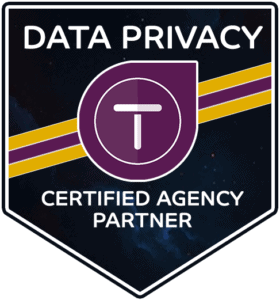Get Protected!
What is data privacy and why does your business need to be concerned?
Ignoring It Won’t Make It Go Away!
You’ve probably received quite a few emails from companies notifying you that they updated their Privacy Policy. Data privacy is becoming a very big deal, and because of that, we at fuseStarter believe you should seriously consider not only getting a Privacy Policy but also having a strategy to keep it up to date.
What is data privacy and why does your business need to be concerned?
Several privacy laws are now in place to protect the personal information of citizens with fines that can reach $2,500-$7,500 per website visitor. Examples of personal information include asking for a name and email on a contact form or using a website analytics tool (like Google Analytics).
It’s getting harder to keep up with!
More and more states are proposing their own privacy laws as well. Over the last several months, many more states have proposed their own unique privacy bills. Some of these bills would enable citizens to sue businesses for having a contact form without an updated Privacy Policy. These states make note that businesses of any size and any location will have to comply or may face fines or lawsuits, which is why we want you to be aware of what’s going on.
What Could Happen To You?
Take a quick watch of this video (only 90 seconds).
It explains what’s happening with privacy laws in the US and how businesses may get fined and/or sued.
Given the large penalties a business may receive for not complying with privacy laws, we want to make sure our clients are aware of what’s going on.
LEARN WHY IT’S IMPORTANT →
OK!! I get it, so what can I do to get Protected?
fuseStarter + TERMAGEDDON
To be proactive about this issue, fuseStarter has partnered up with a Privacy Policy generator called Termageddon. They will automatically update your website policies when the laws change (as well as notify you when changes are coming), and they do it at a fraction of the cost of a privacy attorney. If, however, Termageddon sounds like a good solution, we are offering a Special Offer (see below)!
Termageddon is the only Privacy Policy generator listed as a trusted vendor by the IAPP.org, an organization consisting of 60,000 privacy attorneys and professionals.
fuseStarter is a Data Privacy
Certified Agency Partner

Termageddon monitors privacy laws for you and keeps your policies up to date.
Their attorney-drafted policies offer the most comprehensive solution for complying with CalOPPA, CCPA, GDPR and more.
They monitor cases, regulator guidance and amendments and keep your policies up to date with any changes. They also monitor proposed privacy bills and push updates to your Privacy Policies whenever new laws go into effect.
Their Privacy Policy generator helps protect your business from privacy-related fines and lawsuits.
What Policies Do I Need?
Do I Need a Privacy Policy?
If your website has a contact form, an email newsletter signup form or collects Personally Identifiable Information from visitors in other ways, you need a Privacy Policy.
Do I Need Terms and Conditions?
Terms and Conditions (also called Terms of Use or Terms of Service) are a statement that details the rules of using your website.
Whether you are offering links to third party websites (like social media), want to protect yourself from accidental copyright infringement or have an eCommerce website, it is recommended that every website and application have Terms and Conditions.
Having Terms and Conditions will help you:
- Answer commonly asked questions by customers.
- Lessen your liability by spelling out what warranties, if any, you offer.
- Protect your intellectual property.
- Save costs by specifying where you will resolve disputes if they come up.
- Lessen damages that you may be responsible for in case of a dispute.
- Maintain control over your website and its users.
Do I Need a Disclaimer?
A Disclaimer is a statement that limits the liabilities that a website owner may be responsible for due to the website.
Why do websites need Disclaimer?
Having a Disclaimer will help you:
• Advertise third party products or services. A Disclaimer will help you protect yourself if a user clicks on the third party advertisement and gets a virus or is somehow injured by the product or service.
• Sell or display health products. A Disclaimer will help you protect yourself in this case if the health products do not work as they should, do not deliver the results that were expected or if the user gets injured by the health products.
• Participate in an affiliate program. An affiliate program is a program whereby you list a particular link on your website and, if the user clicks on that link or purchases the products that the link displays, you receive money from the manufacturer of that product. A Disclaimer will help you comply with the manufacturer’s terms and conditions if they require that you display a Disclaimer and will help you keep your user’s trust.
• Provide health and fitness advice. A Disclaimer will protect you in case the user gets injured after following your health and fitness advice, much like the beginning of those exercise videos that you will watch in January of next year.
• Provide information that could be seen by others as legal advice. A Disclaimer will protect you here by stating that there is no attorney client relationship here and that this advice is not legal advice, thus protecting you in case something goes wrong.
Do I Need an End User License Agreement (EULA)?
An End User License Agreement or an EULA is an agreement between a software vendor and a user of that software that spells out the rules of using the software.
Why does software need an End User License Agreement (EULA)?
Having an End User License Agreement will help you:
1. Limit your liability.
2. Protect your intellectual property.
3. Maintain control over your software by restricting certain uses or activities.
Can I add my own CUSTOMIZATION'S and SPECIFICS to the policies?
Tell Me More…
What is a Privacy Policy?
A Privacy Policy is a statement provided on a website that explains how you collect, use, and disclose personally identifiable information. If your website has a contact form, an email newsletter signup form or collects Personally Identifiable Information (PII) from visitors in other ways, you need a Privacy Policy.
What is Personally Identifiable Information?
Personally Identifiable Information (PII) is any data that could be used to identify a specific person. Examples include: Name, Email, Phone number, Physical address.
What laws require websites to have a Privacy Policy?
There are many laws that require websites to have a Privacy Policy:
1. California Online Privacy Protection Act of 2003 (CalOPPA) – a privacy law that applies to any website that collects the PII of California residents;
2. California Consumer Privacy Act (CCPA) – a new privacy laws that protects the PII of California residents;
3. General Data Protection Regulation (GDPR) – a privacy law that protects the PII of European Union residents and applies to businesses outside of the European Union as well;
4. Nevada Revised Statutes Chapter 603(A) – a recently amended privacy law that protects the PII of Nevada residents;
5. And more.
In the United States, more and more states are proposing and passing their own privacy bills. We monitor these privacy bills for you and update your Privacy Policy whenever privacy laws change.
Penalties for not having a Privacy Policy
The penalties for not complying with privacy laws can range from $2,500 per violation (which can mean per website visitor) to $7,500. States like New York are proposing privacy bills which will enable their citizens to sue businesses, of any size and location, simply for having a contact form without an up to date Privacy Policy.
What is Personally Identifiable Information (PII)?
Personally Identifiable Information (PII) is any data that could be used to identify a specific person. Examples include: Name, Email, Phone number, Physical address.
What laws require websites to have a Privacy Policy?
1. California Online Privacy Protection Act of 2003 (CalOPPA) – a privacy law that applies to any website that collects the PII of California residents;
2. California Consumer Privacy Act (CCPA) – a new privacy laws that protects the PII of California residents;
3. General Data Protection Regulation (GDPR) – a privacy law that protects the PII of European Union residents and applies to businesses outside of the European Union as well;
4. Nevada Revised Statutes Chapter 603(A) – a recently amended privacy law that protects the PII of Nevada residents;
5. And more on the way.
In the United States, more and more states are proposing and passing their own privacy bills. We monitor these privacy bills for you and update your Privacy Policy whenever privacy laws change.
What are the penalties for not having a Privacy Policy?
The penalties for not complying with privacy laws can range from $2,500 per violation (which can mean per website visitor) to $7,500. States like New York are proposing privacy bills which will enable their citizens to sue businesses, of any size and location, simply for having a contact form without an up to date Privacy Policy.
What's the deal with General Data Protection Regulation (GDPR)?
Explanation from Termageddon: The General Data Protection Regulation (“GDPR”) is a European Union law concerning data privacy that will start to be enforced on May 25, 2018. It applies to organizations that offer services to, or monitor the behavior of, European Union data subjects, regardless of where the organization is actually located. This means that GDPR applies to virtually every website in the world, whether it is in the United States or France. You should be concerned with GDPR due to the fact that if you do not comply, you could be fined up to 4% of your global turnover, up to €20 million. We believe that a thorough understanding of the law may help you comply.
Thus, let’s start with some definitions:
1. Data subject: a natural person that could be or is identified (e.g. Mary, who puts her email into your contact us form);
2. Personal data: any information that is or could be used to identify a natural person, such as a name, an identification number, location data, etc. (e.g. IP address);
3. Data processing: any operation or set of operations which is performed on personal data or on sets of personal data (e.g. organizing the data into a spreadsheet);
4. Processor: any party that performs the data processing;
5. Controller: person or company that determines the purposes and means of the processing of personal data (e.g. you, the website owner).
Next, there are seven new requirements by the GDPR that you, as the owner of the website or application are subject to:
1. Right to access: users must be provided with complete transparency regarding how their data is processed and stored. You must tell the users what data you are collecting, where this data is being processed and stored and why you are collecting, processing and storing the data. You must provide users with a copy of their data for free within 40 days of request;
2. Breach notification: you must send out a notification within 72 hours of first becoming aware of a data breach. The notification must be sent to all of data subjects that are affected by the breach. Furthermore, data processors are required to notify users as well as the data controllers immediately after first becoming aware of the breach;
3. Request for consent: consent must be given in an intelligible and easily accessible form, with the purpose for data processing attached. It must be as easy to withdraw consent as it is to give it;
4. Right to be forgotten (data erasure): the data subject has the right to have you erase his/her personal data, stop further dissemination of the data and potentially have third parties also stop the processing of the data;
5. Data portability: the data subject has the right to receive the personal data concerning him/her, which they have previously provided in a commonly used and machine readable format and have the right to transmit that data to another controller; and
6. Privacy by design: calls for the inclusion of data protection from day one of designing systems. Requires that you hold and process only the data completely necessary (data minimisation) and requires you to provide the data to only those persons that need it.
7. Depending on the size of your company, you may need to appoint a person responsible for GDPR compliance.
While the above requirements may seem onerous, the best course of action is to fully understand and evaluate the data that you collect, keeping in mind that the more data you collect, the more difficult and time consuming compliance will become.
Furthermore, you should have a concrete plan in place for responding to data subject requests and for dealing with potential or actual breaches.
GET TERMAGEDDON AT OUR SPECIAL RATE!
As a Termageddon Partner, fuseStarter is able to offer Termageddon at a Special Rate!
Once you signup for Termageddon, it needs to be installed and tested on your website(s).
We typically charge a one-time setup fee of $100 to create the policy pages, insert the code, and test…
BUT, we are WAIVING the $100 Setup Fee for existing fuseStarter clients!
TERMAGEDDON
fuseStarter Special Offer- Automatically Updated Compliant PRIVACY POLICY!
- Automatically Updated Compliant TERMS & CONDITIONS!
- Automatically Updated Compliant DISCLAIMER!
- Automatically Updated Compliant EULA!
- Automatically Updated Compliant GDPR!
- Allows for addition of your client specific text (HIPPA, FINRA, etc.)
- $100 Setup Fee WAIVED!
READY TO GET STARTED?
Don’t put it off, it’s real…
We will get your implementation scheduled and make sure you are protected and compliant and always up-to-date!
Please let us know if you’d like to move forward with Termageddon,
OR are hiring a privacy attorney, OR are choosing not to have a Privacy Policy on your website.
If you aren’t interested in having a Privacy Policy on your website, we will have you complete our Website Policies Waiver form for our records.

